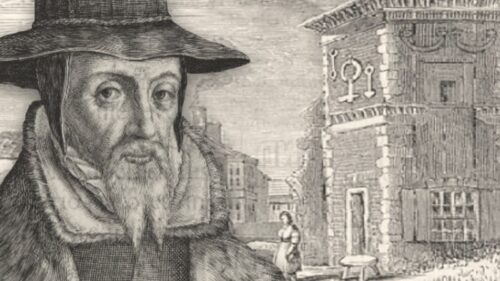
A Sinner Becomes A Saint: William Huntington’s Conversion
One evening, Huntington was sitting by the fireside reading his Bible when he came across the words, “At that day ye shall know that I am in my Father, and ye in me, and I in you,” John 14:20. These words were at first incomprehensible to Huntington as he had not experienced being ‘in Christ’ and being thus a new creature. “There must be some secret between Christ and those whom He will save, that I am ignorant of,” he exclaimed. As he thought on these things all his sins paraded themselves before him and all his false hope disappeared in a twinkling. Great conviction came upon him but his first thoughts were of hatred to God for putting him in such a position. He shouted out to his wife in great fear, “Molly, I am undone for ever; I am lost and gone; there is no hope nor mercy for me; you know not what a sinner I am, nor what I feel!” Amazed Mary tried to comfort her husband as well as she could but her Christian experience was weak and she did not know what was happening to him.
All through that night Huntington confessed his sins to God but dare not plead with his Maker for forgiveness as he was so certain that his own iniquities had damned him, cutting him off from God’s mercy for ever. He staggered to work the following morning looking at the horses and cows in envy telling them that they would never be punished for their sins and they would never have to stand trembling at the Judgement seat only to be cast into hell. Next came an overbearing conviction that he could escape all by taking his own life but soon thoughts of the wrath to come after death drove Huntington back to thinking more soberly. In this way Huntington lived through the days of the following weeks overcome with horror at his own self and at his hopelessness until he was completely run down and exhausted. But going one morning to work, Huntington suddenly asked himself which part of the world Christ was born in. He confessed that he did not know but judged it to be the East. He thus looked in that direction and began to daydream about Christ’s name. Whilst his mind was fixed on the birth and name of Jesus he was suddenly overwhelmed with a spirit of love and meekness. Just as suddenly he felt like a bottle without a vent and began weeping tears of joy so loudly that he feared people must have heard him miles away. Huntington’s thoughts progressed to the sufferings of Christ on the cross which made him ‘melt, mourn and weep’. As yet, he had no doctrinal knowledge of Christ’s death but he heard a voice distinctly say, “He that overcometh shall inherit all things”, a phrase Huntington did not understand at the time, nor did he know that it was a passage from Scripture.
Now for many days Huntington was as taken up with thoughts of God’s loving-kindness in Christ as he had been by his own sin and earned destruction. Temptations came in an endless train but Huntington began to experience that God’s Grace was sufficient. He was rescued from perils into which he had fallen head first before. The more, however, Huntington praised God for temptations defeated, the more they came and still the inner voice told him, “He that overcometh shall inherit all things”. It seemed, however, as if the Lord were showing Huntington that he could not overcome – at least not without earnest pleas heavenwards. Huntington found himself now at all times shaking his head against temptations which came five a minute and opening his lips to praise God. This caused his work mates to think he had gone mad. So taken up was Huntington with the battle in his soul that he could not give a rational answer to a simple question as his thoughts were so strongly concentrated on the forces at work within.
After so many disappointments at so many different churches, Huntington decided he would be his own pastor and stay at home and read the Bible. Now, wherever he looked, he found passages telling him that only the elect would be saved. He thus took a piece of paper and a pen and read through the whole Bible jotting down all the references to man’s hopelessness and God’s sovereignty. Such verses as “No man can come to me, except the Father which hath sent me draw him,” John 6:44 and “I know whom I have chosen”, John 13:18 fixed themselves so deeply in Huntington`s memory that he never forgot them. After thus going through the entire Scriptures Huntington concluded that “the doctrines of predestination and election reflect the tremendous doctrine of reprobation in many passages of scripture”. Now Huntington was in a worse dilemma than ever. What if he merely felt the damnation that was common to all the non-elect? What if all his repentance and sorrow for his sins, however true, were in vain?
Such thoughts were plaguing Huntington one day whilst he was up a ladder pruning a large pear tree. He kept telling himself that though he strove to be holy, he was as worldly as ever. True, he was always trying to please God and appease his wrath, but it was without any success whatsoever. The doctrine of election, he told himself, is true. If I am not one of the elect, I shall never be saved, do what I will. When thinking along these lines all Huntington’s bitterness concerning his bastard birth came back to his mind and he thought of the horrible life and death of his true father. He thought also of his mother who took the Lord’s Supper regularly but lived in open adultery. He thought of the Old Testament passages that damn bastards and cried out from the tree top. “Is hell to be the reception of both progenitors and progeny? I see no way of escape. Oh wretched end!”
As Huntington was deep in self-pity and self-reproach a great light seemed to shine all around him and swept all his anxious thoughts away. As clear as a bell Huntington heard the words of John 14:26 “But the Comforter, which is the Holy Ghost, whom the father will send in my name, he shall teach you all things, and bring to remembrance, whatsoever I have said unto you. . . . . . . Let not your heart be troubled, neither let it be afraid.” Two sets of Scripture references poured into Huntington’s now relaxed and receptive memory. All those which cursed the sinner and all those who spoke of the goodness and graciousness of God in salvation. Huntington climbed down the ladder wondering what was happening to him. “What is it? What is it?,” he cried out. He then distinctly heard the words that he never forgot. “Lay by your forms of prayer, and go pray to Jesus Christ; do not you see how pitifully he speaks to sinners?”
Huntington was not disobedient to the heavenly vision and dashed into the tool shed with his apron over his head and face for fear of what was happening. He then knelt down and prayed extempore (his prayers up to now had been combinations of written prayers with his own comments) “Oh Lord, I am a sinner, and thou knowest it I have tried to make myself better, but I cannot. If there is any way left in which thou canst save me, do thou save me; if not, I must be damned, for I cannot try any more, nor won’t.” The very moment that Huntington said these words, he felt a freedom to unburden his soul before the Throne of Grace and prayed with fluency in the language of Scripture that was quite new to him. All the blessed promises of God to a repentant sinner came into his mind and heart and he bombarded the Heavens with all the Biblical claims on God’s Grace he could muster. He then saw Christ crucified before him as in a vision and he had never felt his own sin so deeply as he did at that moment. He now prayed loudly, “I did not know till now that I had been sinning against thy wounds and blood! I did not know that thou hadst suffered thus for wretched me! I did not know till now that I had any concern in crucifying thee! I cannot beg mercy of my suffering Lord and Saviour. No: send me to hell for I deserve it.”
The more Huntington denied his right to Christ’s love the more Christ seemed to approach him in love. Slowly but very surely a conviction of God’s forgiveness displaced Huntington’s assurance that he was hell-bound. Thoughts of Satan, death, destruction, horror and despair fled as a composure serene and full of new-born hope replaced them. Huntington had met his Lord at the one place where all must meet him who are His – at the Cross. There the farm-labourer met the King of Kings. He went, to use his own words, into the toolshed in all the agonies of the damned, and came out with the Kingdom of God established in his heart. What a change!
Taken from pp. 48-49, 52-54 in William Huntington: Pastor of Providence.
George Ella
——————————————
George M. Ella is a historian, author and biographer. His writings may be accessed at the online archived, ”Biographia Evangelica”.
George M. Ella, born February 1939 in Yorkshire, England, has lived most of his life on the European Continent. He is a retired Senior Civil Servant formerly employed in teaching, post-graduate teacher-training, chairing examination boards and curricula work. He holds degrees from London, Hull, Uppsala, Essen, Duisburg and Marburg universities with doctorates in English Literature and Theology. Dr. Ella has written regularly since the seventies for a number of magazines and newspapers and published numerous books on Church History, including biographies of William Cowper, William Huntington, James Hervey, John Gill, Augustus Montague Toplady, Isaac McCoy and Henry Bullinger besides works on doctrine and education. He is currently finishing the third volume of his series 'Mountain Movers'; a biography of John Durie; a work on Law and Gospel and further study material for the Martin Bucer Seminar. Dr. Ella is still internationally active as a lecturer and is a Vice-President of the Protestant Reformation Society. He is keenly interested in missionary work and has written on the spread of the Gospel amongst the Same people of Lapland, the people of India and the Native Americans. This present volume follows Dr. Ella's 'The Covenant of Grace and Christian Baptism', also published by the Martin Bucer Seminar. George Ella is married to Erika Ella, nee Fleischman, a former government administrator, and they have two sons Mark (41), Director of a Polytechnic College in Bremerhaven and Robin (39), Leading Senior Physician in a newly-built Geriatric and Psychiatric clinic in Dessau.
George Ella on Doctrinal Matters
George Ella's Biographical Sketches





